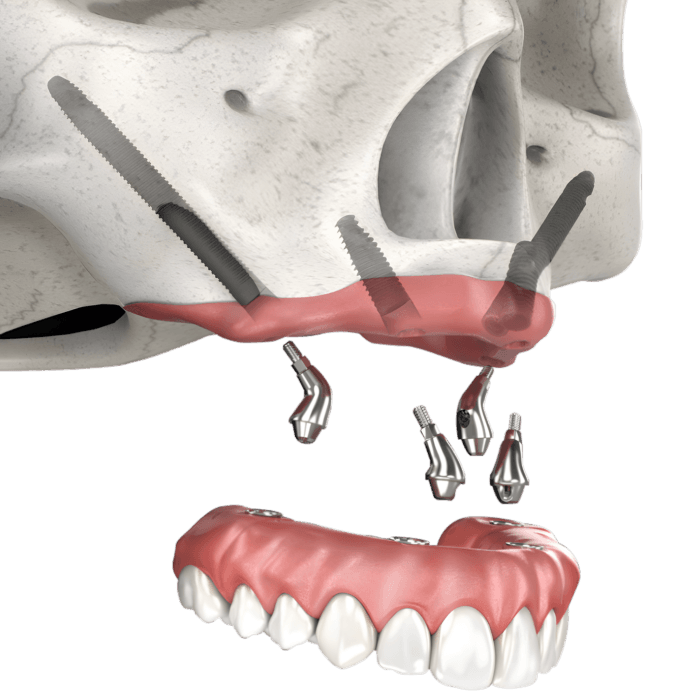What are Zygomatic Dental Implants?
Zygomatic implants are designed to provide support for a full arch of teeth in cases where there is insufficient bone in the upper jaw to support traditional implant placement. The procedure involves anchoring the implant into the zygomatic bone (cheekbone), which provides a more secure foundation for the All on 4 dental implant.
Zygomatic dental implants are typically longer than traditional implants and are placed at a 45-degree angle in the jaw bone to maximise support and stability and remove the need for bone grafts.


Do I Need Zygomatic Implants?
- Zygomatic implants offer a viable dental implant solution for patients with a severe loss in the upper jaw bone, providing increased stability, improved aesthetics, reduced treatment time, and an improved quality of life.
Our Process
1The Procedure
The procedure for the zygoma implant placement is typically performed under general anaesthesia and involves a team of dental professionals, often including a prosthodontist and an oral and maxillofacial surgeon. The process begins with a comprehensive evaluation of the patient’s dental and medical history, as well as a CT scan of the jawbone and maxillary sinus.
Once the patient has been cleared for the procedure, the dental surgeon will create a small incision in the gum tissue and use specialised instruments to prepare the zygomatic bone for the implant. The implant is then carefully placed into the bone and secured into place.
After the implant placement, a temporary denture is attached to the implant to allow for healing and osseointegration (the process by which the implant fuses to the bone). Once the implant has fully integrated, the temporary denture is removed, and a permanent set of teeth is attached to the implants.

Zygomatic Implants Pricing
FAQ: Zygomatic Implants
We’ve put together some of the most common dental implant questions to help you make an informed decision.
What Type of Patients do Zygomatic Implants Suit?
Often prolonged periods in a denture or tooth loss are linked to jawbone deterioration. With tooth loss, the bone may reshape and can lead to the loss of bone foundations that are necessary for conventional dental implanting.
In most cases, the sinus spaces above the upper jaw also expand, thus weakening their underlying bones further. If the maxillary bone is inadequate to fit traditional dental implants, zygomatic implants can allow you to receive a full implant replacement without any bone grafting.
How Successful Are Zygomatic Implant Treatments?
Zygomatic implant procedures are very effective, especially considering the advancements in dentistry implant technology in the recent twenty years. In general, dental implants can only be successful when they meet certain conditions that can affect general health and the ability to maintain them as regularly as needed.
The implant requires brushing and flossing twice a day to ensure the implant’s hygiene as well as its proper cleaning. It’s also advised to attend regular dental hygiene visits to remove any spots that would otherwise need cleaning.
How Long do Zygomatic Implants last?
These dental implants are extremely durable and are designed to be a long-lasting solution for patients. While the longevity of zygomatic implants can vary based on factors such as the patient’s oral hygiene habits, overall health, and lifestyle factors, studies have shown that zygomatic implants have a high success rate and can last for many years.
One study published in the Journal of Oral and Maxillofacial Surgery found that the survival rate of zygomatic implants after 5 years was 95.5%, and after 10 years, it was 91.6%. Another study published in the International Journal of Oral and Maxillofacial Surgery found a 10-year survival rate of 91.8%.
With proper care and maintenance, including regular dental check-ups, good oral hygiene, and avoiding habits such as smoking and excessive alcohol consumption, zygomatic implants can last for many years, providing patients with a natural-looking, functional set of teeth.
However, as with any dental procedure, it is important to discuss the expected lifespan of zygomatic implants with an experienced dental professional to determine if they are the right solution for your individual needs.
What is the Difference between Zygoma and Conventional Dental Implants?
Zygoma implants attach to the cheek bone (zygoma bone) rather than the jawbone (alveolar bone). They are very stable, so they provide the perfect support for immediate replacement teeth and full-arch dental bridges.

